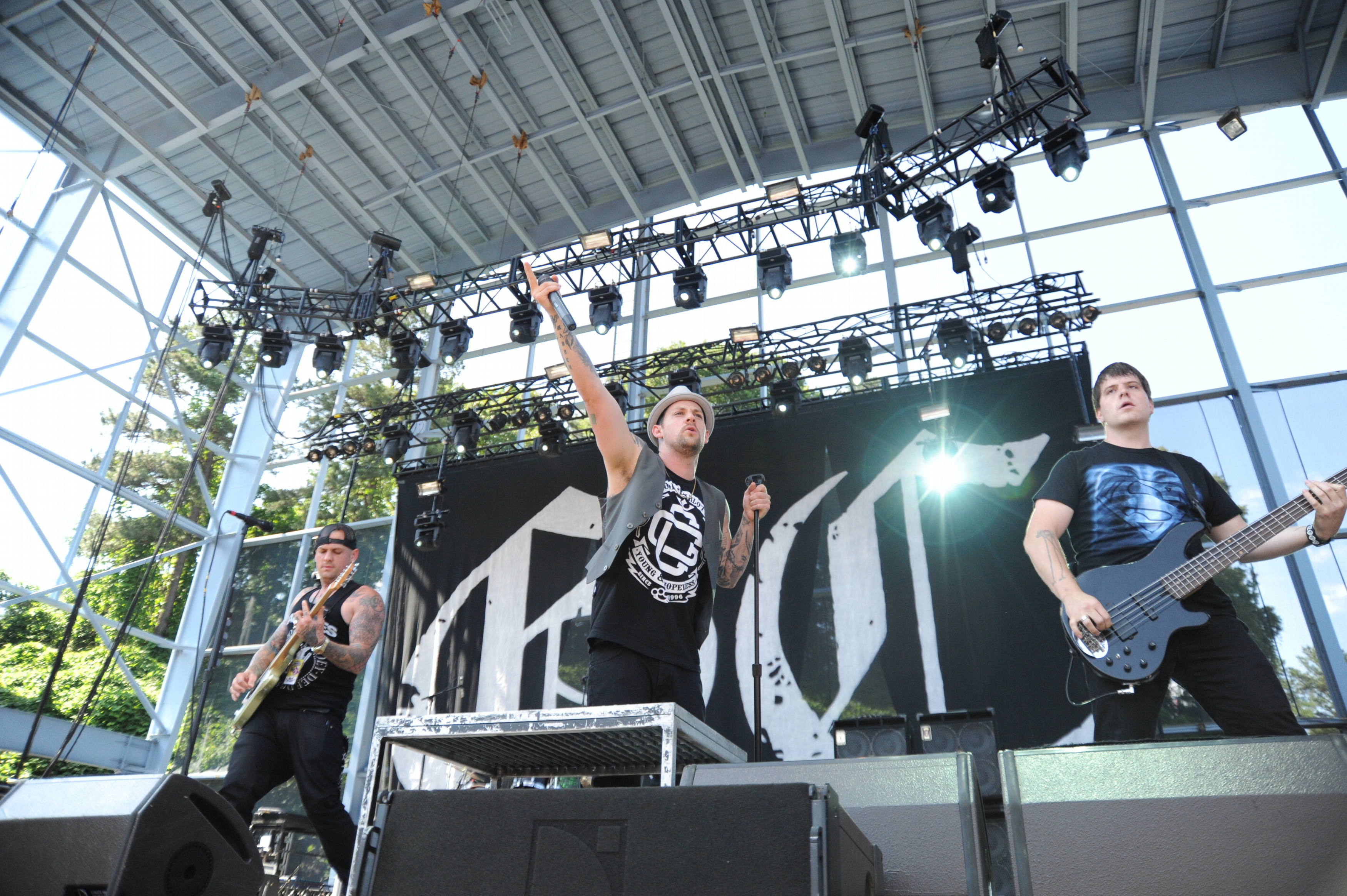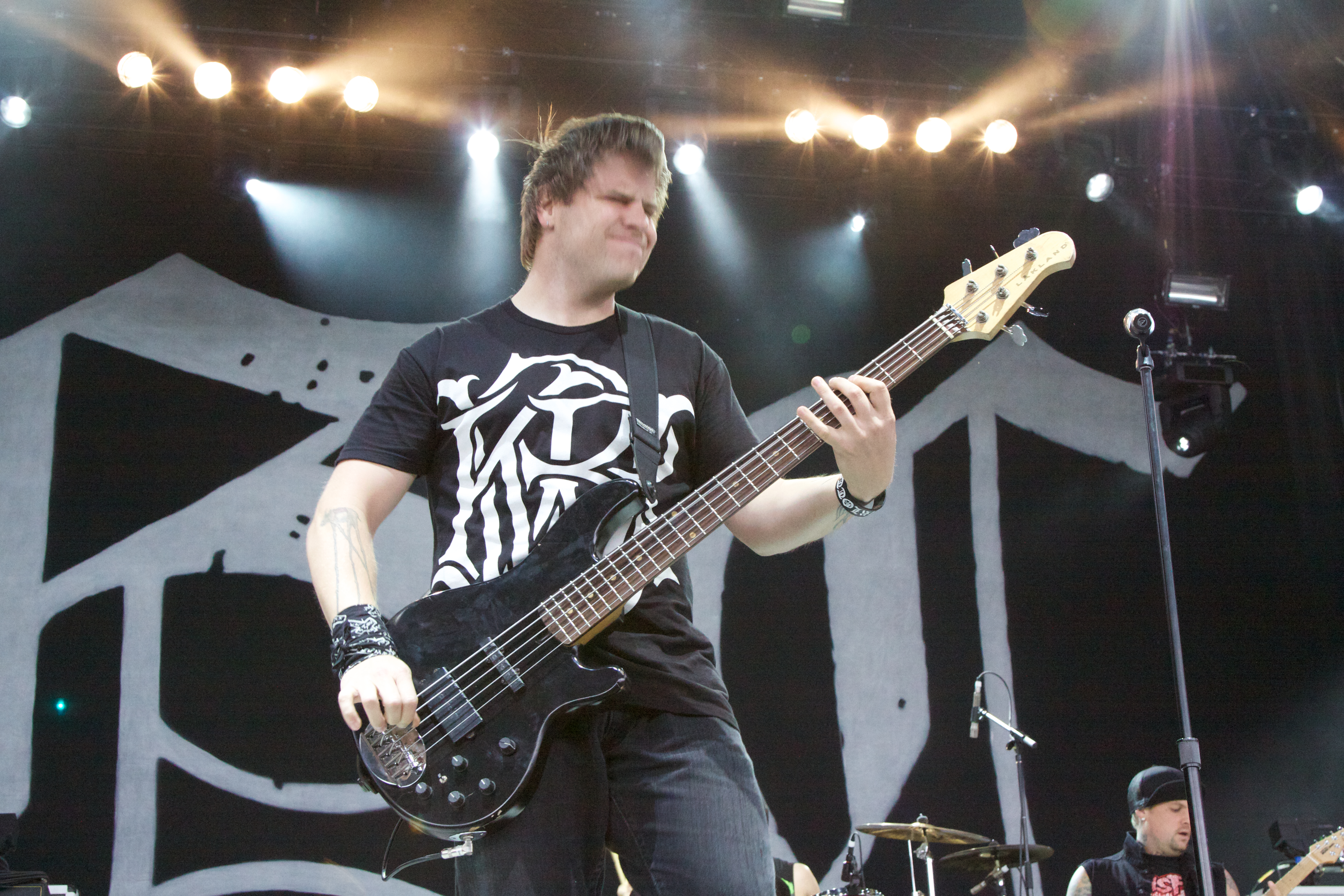Good Charlotte bass writing masterclass
Paul Thomas on writing bass for GC's biggest hits

Good Charlotte live

Paul Thomas of Good Charlotte
BASS EXPO 2014: When it comes to dance floor fillers, Good Charlotte have more than a handful to their name. Insanely catchy tunes with memorable basslines, guitar riffs, and big sing-a-long choruses, those Maryland boys sure know how to write a hit song.
Paul Thomas has been with the band since its inception. A rock bassist by nature, he knows exactly what makes a Good Charlotte bassline tick, having written them for each of the band's five hit albums. For Bass Expo 2014, we chatted to Thomas about his playing style, his various muses, and how he writes for Good Charlotte.
We also asked him to breakdown the basslines on three of Good Charlotte's biggest hits, explaining how he came up with them, what gear he used, and how you can play them at home.
To begin, how would you describe your bass playing style?
"It's rock bass. I play with a pick, which brightens the bass and adds more punch to it. This allows the bass to blend well with distorted guitars. The majority of GC songs recorded were played with a pick, but there are the occasional songs where I wanted a more fluid and smoother sound. So I would play on songs with my fingers when the song called for it (typically ballads).
How do you stay inspired when creating new music?
"My muse appears to me in a different form every time a new idea for a song is created. Sometimes I'm inspired by music or film, but more typically it's my surroundings that truly inspire me. Family, work, school, the city I live in, the books I read... All of these things inspire the creation of a song."
Get the MusicRadar Newsletter
Want all the hottest music and gear news, reviews, deals, features and more, direct to your inbox? Sign up here.
When writing Good Charlotte basslines, do you work closely with other members of the band?
"Actually, it's usually just me and the producer (or sometimes the engineer) who are in the room when I record my bass lines. I think the other guys are confident that I will come up with something that sounds good. It's more of a compliment really, knowing that the guys trust me and don't feel like they have to hover over my shoulder making sure I play the bass right."
What is your favourite Good Charlotte bassline to play and why?
"Mountain is my favourite to play live. It's not one of the bigger hits, so we only get to play it when we have a long set. I absolutely love the heavy riff at the end of the song and playing it live is always fun. Nobody's standing still during that part of the song."
"Family, work, school... All of these things inspire the creation of a song"
If you were suddenly unable to play with the band for a number of gigs and needed to hire a dep, what advice could you give them about playing your role in the band?
"This has actually happened for me - I had to miss some shows when my son was born. Dean [Butterworth, drummer] is a man with resources in the music world. He knows a great guitarist/bass player named Serge who filled in for me. We had a rehearsal and I walked him through the set and the bass lines. He did a great job according to the guys. The only advice I would give anyone on filling my shoes is to just play solid and stick with Dean."
We heard you and Dean have formed a band. What can you tell us about it?
"Yes, Dean and I have a side project called The Strayed with my buddy Phil who lives in the Bay Area. GC have been on sabbatical while Benji [Madden, guitars/vocals] and Joel [Madden, vocals] have been working on their Madden Brothers album. I have been in school pursing a CIS degree, but I just can't stop making music. The Strayed put out a six song EP last year and we will put out another EP this year, too. I'm really inspired by bands like Crosses and Phantogram with the idea of just putting out small EPs but doing it frequently."
In this next part of the interview, Thomas walks us through the basslines on three of Good Charlotte's biggest hits, explaining how he wrote them, and the gear and techniques used...
Girls & Boys
The writing: "I wanted the verses to have an 80s feel, so I took the feel from Cars by Gary Numan and incorporated into the notation of our song. It really took the song to the next level and I feel it was one of the biggest impacts I've had on a song."
The gear: "It was recorded with a 2002 four string American Fender Jazz. We went to Guitar Center and tried out every bass they had. The Guitar Center in LA on Sunset has a crazy large selection of classic basses from the 60s and 70s, but it was a cheaper new bass that we felt sounded the best. Almost all of The Young And The Hopeless was recorded on that bass.
"I usually play a five string bass but we found that a four string tuned down sounded better. I had to teach myself how to play the songs in dropped tuning. We used a classic Ampeg SVT through an Ampeg 8 x 10 cab. I also used GHS Boomer bass strings - the heavier gauge seemed to work better with the drop tuning."
The technique: "The verses are palm muted. I play the chorus all on the E string. I feel that an E played holding the 7th fret of the A string doesn't sound as strong as an E played holding the 12th fret of the E string. Other than that it's a pretty straight forward bass line. Not too many tricks."
I Don't Wanna Be In Love (Dance Floor Anthem)
The writing: "This bass line already existed on the demo, played by either Benji or Don Gilmore [producer]. I made a few changes here and there and made the bass line into my own."
The gear: "Dance Floor Anthem was recorded with a five string Ernie Ball Music Man StingRay. Don was more of a minimalist when it came to recording bass. We used only direct signals, one from an Avalon DI and the other from a Sans Amp DI. That's it - no mics, no amps."
The technique: "When I play this song, I usually do down strokes only. It's a very simple and straight forward song. The rhythm of the verses is a little tricky, but all you have to do is follow the drums."
We Believe
The writing: "This is one of my favourite bass lines. It's hard to say where the inspiration for the bass line came from. Eric Valentine [producer] helped me write the verses and the ending. He has such a good ear for melodic notes. So I would come up with the feel and the idea, and then he would help me fine tune it."
The gear: "We Believe was recorded on a '68 Fender Precision Bass - I managed to lose the Fender Jazz I used on The Young & The Hopeless - and we used a Classic Ampeg SVT. Once again, we used a four string bass and I had to tune down for the low notes I usually play on the B string."
The technique: "I played and recorded this song using my fingers instead of a pick. In the verses I'm basically playing a guitar chord and plucking the strings with my thumb, pointer and middle fingers. The end is my favourite part of the song. I love how the bass keeps moving - it's fun to play."
Interview: Claire Davies
You can find out more about Paul Thomas' new side project The Strayed by visiting their official website
“I really thought I was going to die... and it absolutely was so freeing”: Blink 182’s Mark Hoppus talks surviving cancer and his band’s resurrection
"I remember showing up at 10 or 11 in the morning and working on solos and that leading to two or three o’clock in the morning the next day”: How Metallica beat the clock and battled fatigue to create a poignant and pulverising anti-war epic









